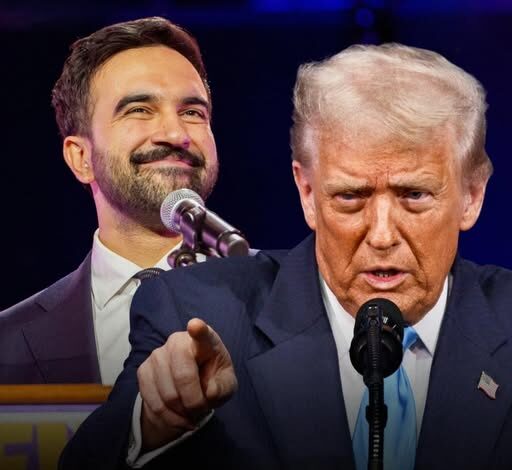Mamdani pledged to freeze rent for two million New Yorkers, expand free bus service, make child care universal, and invest in public housing. He also announced plans for a new department to address mental health and homelessness — promising to make New York “a city that takes care of everyone, not just the privileged few.”
When President Donald Trump labeled him a “communist” during the campaign, Mamdani didn’t back down. On election night, he fired back with confidence:
“Donald Trump, since I know you’re watching — I have four words for you: turn the volume up.”
The crowd erupted as he continued, “New York will always be a city of immigrants — built by immigrants, powered by immigrants, and now, led by one.”
But his criticism didn’t stop at Republicans. Mamdani also took aim at establishment Democrats, declaring, “We can’t call ourselves the party of the people if we keep governing for the powerful.”
From Queens to City Hall: The Unlikely Journey
Born in Uganda and raised in South Africa, Mamdani immigrated to New York at the age of seven. A graduate of Bronx Science and Bowdoin College, he worked as a housing counselor before entering politics. In 2020, he was elected to the New York State Assembly, championing housing rights and immigrant protections.
His family is remarkable — his father, Mahmood Mamdani, is a Columbia University professor, and his mother, Mira Nair, is the acclaimed filmmaker behind Monsoon Wedding. Yet on the campaign trail, Mamdani rarely mentioned them. His focus remained on working people, tenants, and small business owners — the lifeblood of the city.
Critics tried to mock his early years as a rapper named “Mr. Cardamom,” but the attempt backfired. Instead, voters saw authenticity — a leader unafraid to embrace his past and laugh at himself.
A Movement Built on Inclusion and Hope
Mamdani’s campaign thrived online, using multilingual outreach in Urdu, Bangla, Spanish, and Arabic to reach communities often overlooked by city politics. His explainer videos on rent control and public transit went viral, and his term “Halalflation” — describing the struggles of Muslim street vendors facing rising costs — became a rallying cry.
Meanwhile, Cuomo’s campaign relied heavily on establishment support and high-dollar donors. But voters viewed him as a relic of the past — part of the very system Mamdani promised to challenge.
By the primaries, Mamdani’s rallies were overflowing. His slogan, “The City Belongs to the People,” became both a chant and a creed. On Election Day, it carried him all the way to City Hall.
What Comes Next for New York
Mamdani now inherits a city facing deep challenges: rising rents, worsening homelessness, and a shrinking middle class. His ambitious agenda — rent freezes, free transit, and major public housing reform — will test the limits of city budgets and political alliances.
But his supporters remain hopeful. “We didn’t elect him to manage the system,” said one campaign volunteer. “We elected him to change it.”
Even some critics acknowledge his impact. Political historian Michael Dyson noted, “Mamdani’s election marks a generational and cultural turning point. The city that once elevated bankers and bureaucrats now elevates organizers and activists.”
Local media have already dubbed his transition team the “Tenant’s Cabinet” — a reference to the community advocates, teachers, and housing organizers expected to hold top positions in his administration. Balancing idealism with pragmatism will define the next chapter of his leadership.
Still, for many New Yorkers, his victory represents something deeper than politics. It’s a story of belonging — of a child of immigrants who dared to dream beyond the boroughs, and of a city rediscovering its own heartbeat.
As chants of “Zohran! Zohran!” filled the streets on election night, Mamdani raised his fist one last time before leaving the stage.
“The dawn of a better day,” he said softly, “starts right here.”
And for millions watching across the five boroughs, it truly felt like it had.
What do you think about Zohran Mamdani’s historic win? Could his leadership redefine what it means to govern New York City? Share your thoughts below — your voice matters in this conversation.

